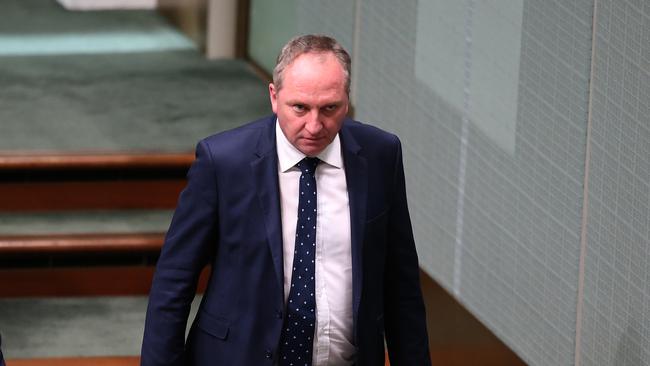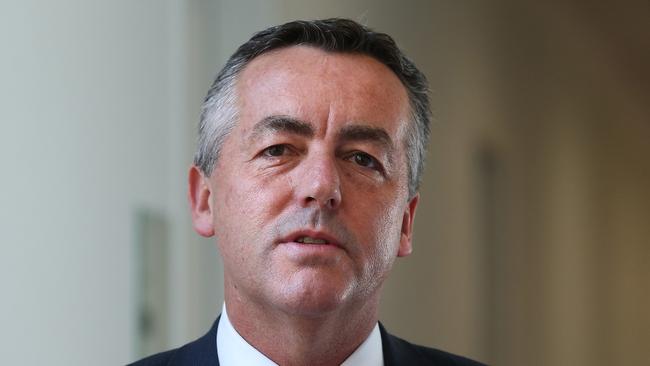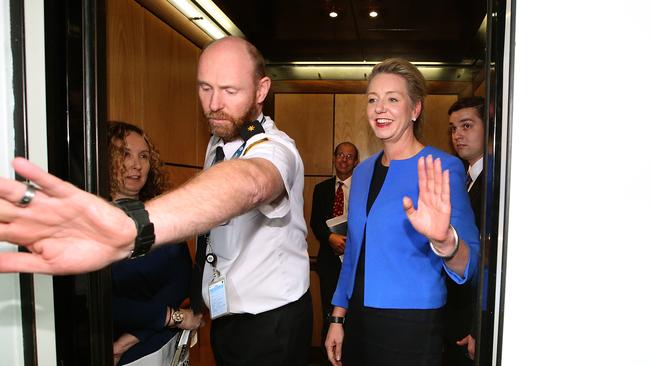Be careful what you wish for in Joyce affair
EVEN if Barnaby Joyce goes, the secret deal between the Liberals and Nats will remain, writes Terry Sweetman. And that shadowy arrangement gives enormous power to a small minority.
Rendezview
Don't miss out on the headlines from Rendezview. Followed categories will be added to My News.
MANY people would have come to the conclusion that Barnaby Joyce is unsuited and unfit to be Deputy Prime Minister and absolutely unworthy of being Acting Prime Minister.
Yesterday’s events suggest they might even include Prime Minister Malcolm Turnbull.
However, aggrieved citizens should be careful of what they wish for after looking at who could be in line for the second highest elected position in the land should Joyce do the honourable thing.
Deputy Nationals leader, Bridget McKenzie is a comparative novice and a senator, which poses leadership problems that could only be solved by the sort of switcheroo that allowed Joyce (and Liberal John Gorton) to swap houses.
The rest of the House of Representatives team doesn’t exactly inspire confidence, with potential candidates ranging from the unknown, the unlovable and the unbelievable, to those caught up in L’affaire Barnaby.
First to toss his hat into the ring was Queenslander Ken O’Dowd, the Member for Flynn. You may well ask “Ken who?”.
Frontrunner seems to be Michael McCormack, Minister for Veterans’ Affairs, Member for Riverina but a two time loser in deputy leadership votes.

One who probably should be resurrected is Darren Chester, Member for Gippsland, who was famously junked by Joyce from Cabinet in what seemed a fit of spite after the battle that gave McKenzie the deputy’s job.
But if McKenzie hangs in Chester would be one Victorian too many for the Party.
However, the Nats will find a new leader if they have to and that person will by convention and the Coalition agreement be deputy PM and, at times, acting PM.
But we ordinary folk never actually get to see the details of the agreements hammered out by the Liberals, the National Party (or Country Party) and, confusingly, the Liberal National Party, that have given a minority grouping such clout since 1925.
The Nationals (and predecessors) have been in government coalition with the majority conservative parties under their various guises in 23 of our 45 Parliaments.
It has provided some strong and wise leadership — Arthur Fadden, John McEwen, Doug Anthony and Tim Fischer spring to mind — but it has extracted a high price for its services.
In government, it has had as few as 10 and as many as 23 members of the lower house and its Senate numbers have ranged from three to six.
In the current Parliament the Nationals hold 16 out of 150 lower house seats and five out of 76 Senate seats.

From that it has managed to win five out of the 22 seats in the Ministry and three of a dozen Assistant Ministries.
But, never mind the numbers, feel the quality.
The Party has historically claimed strategic portfolios with assertions of traditional connections that don’t always hold up.
Joyce, for example, has seized Infrastructure and Transport, two responsibilities that are far from exclusively the concern of regional and country folk.
Matt Canavan holds Resources and Northern Australia, two areas that, despite their geographic claims, are of equal concern to urban voters who fret about his tight relationship with the mining industry.
David Littleproud has Agriculture and Water Resources, two responsibilities that are vital to the National Party base but are equally the concern of urban Australians worried about their impact on the environment and the national heritage.
Not even Indigenous Affairs, under the stewardship of Nigel Scullion, is entirely a regional interest because statistics show that 75 per cent of Aboriginal people live in cities and non-remote areas.
This is not to say National Party Ministers are disqualified as administrators of their portfolios but they enjoy no exclusivity.
This Coalition — the agreement which might be written on vellum, inscribed on gold tablets or sealed with a handshake for all we know — is a strange thing.

It goes way beyond the sort of preference deals — some shabby — that all parties indulge in during elections.
The Liberal Party’s commitment to free markets and small government is at odds with the Nationals’ unspoken but famous liking for intervention and rural socialism.
The Nationals speak of the national public interest but unashamedly make their pitch to rural Australia.
Both are culturally conservative but on federal and the state levels they have had some difficult times in reconciling their social views.
What bonds them more than anything else is the hunger for power and a desperation to hold into it. It’s raw politics and in a coalition it’s always a sellers’ market for the minority National Party.
For us it will mean a second-rate Deputy Prime Minister and occasional Acting Prime Minister thrust upon us by an agreement we never get to see.
In October New Zealand Prime Minister Jacinda Ardern made history by releasing the terms of her coalition deal with NZ First and the Greens.
When it comes to transparency we are once again left behind by our neighbours.


